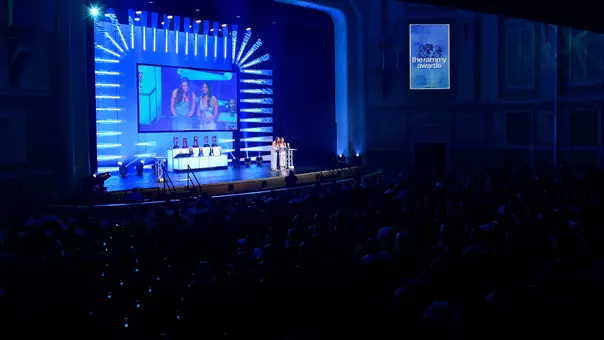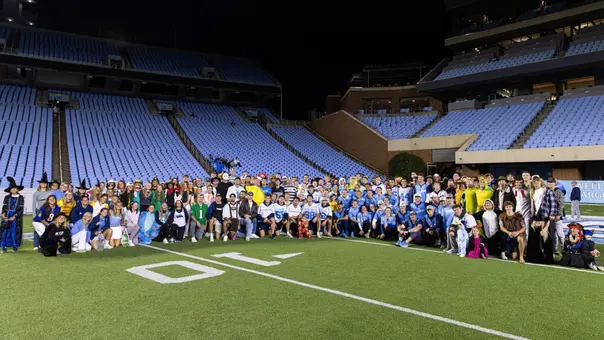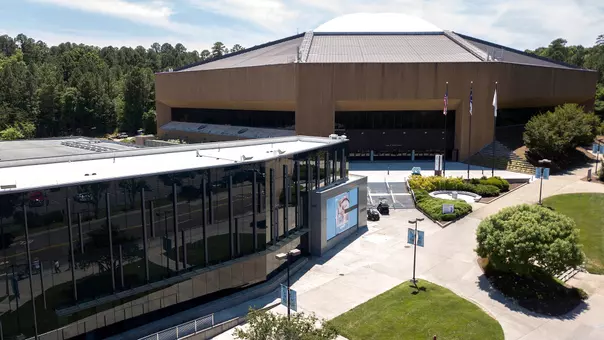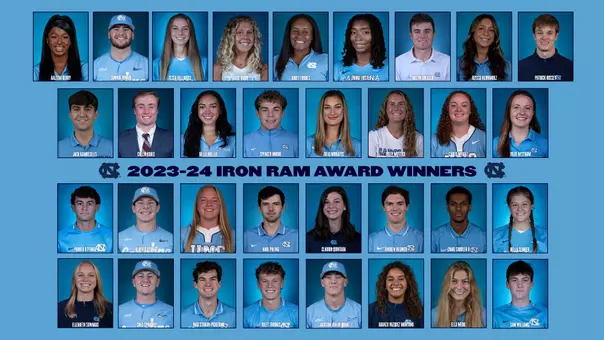University of North Carolina Athletics
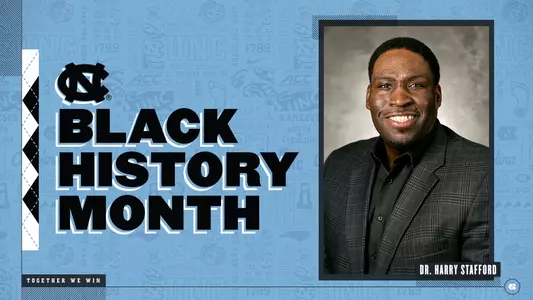
Dr. Harry Stafford Cares For Students At Numerous Schools
February 17, 2022 | Sports Medicine, Athletics
Former Tar Heel Track Athlete A Leader in Sports Medicine
If you live long enough in an area with multiple colleges rarely does a day go by without being asked to clarify one's allegiance.
Here in the Triangle, it's "Are you a Tar Heel or a Blue Devil or, perhaps, do you run with the Pack?"
When posing that question to Dr. Harry Stafford, you may want to grab a coffee and take a seat because the answer is lengthy and distinguished and will make your day planner seem inadequate.
First, Stafford is a Tar Heel three times over. He was a thrower on the UNC track and field team and earned his undergraduate degree from UNC, was graduated from the UNC School of Medicine in 2002 and recently earned his Master's in Business Administration from the Kenan-Flagler Business School. He served more than 10 years as a team physician at his alma mater.
Throughout February, Carolina Athletics is commemorating Black History Month, the theme of which this year is health and wellness, by highlighting former student-athletes who are making an impact in health care.
The Kannapolis native is currently the Associate Director for the Duke Sports Science Institute. That includes the Pepsico Fitness Center, which is Duke's home for physical therapy, sports performance, sports medicine clinic and nutrition. He is also the Director of Sports Performance at Duke and is a team doctor, primarily with the Blue Devil football team. He also attends to patients from the general population at Duke and continues to work with UNC Sports Medicine to care for community schools and local athletes.
Stafford is also the Director of Sports Medicine at NC Central, where he has worked with Eagle student-athletes and teams for the past 20 years. He was just named the chief medical officer for the Mid-Eastern Athletic Conference, an eight-team conference based in Norfolk, Va., that includes NCCU and schools from four other states and the nation's capital.
Carolina, Duke, NCCU, the MEAC, that's a lot of connections, but Stafford's work load still doesn't end there. He also sees student-athlete patients at St. Augustine's and Shaw in Raleigh and Hillside and Southern High Schools in Durham.
Stafford began his love affair with the local college scene as a student-athlete at Carolina, where he trained under former head coach Dennis Craddock, who won more Atlantic Coast Conference team championships than any other coach in league history. Stafford worked with throws coach Dennis Mitchell and was a teammate of Harlis Meaders, an ACC champion and All-America who later was the Tar Heels' head coach.
"Growing up in Kannapolis a lot of our athletes ended up going to Carolina so I felt that's where I was going to go," says Stafford. "I came up on a visit to UNC and just fell in love with the place and Coach Craddock. I did the shot put, discus and the 35-pound weight, and that four-year experience was absolutely phenomenal. When I was on the track team I worked with Dr. (Gerald) Tuttle, who was our team doctor at the time, and Dr. (Tim) Taft, who was the director of sports medicine. And I thought sports medicine might be what I want to do."
Even in his high school days, Stafford was already thinking about his future career path, one that may involve working in sports performance.
"My dad's a funeral director, so growing up I was always around the funeral business and helped him with stuff, went to funerals, kept the cars clean and the whole deal. We had a conversation my junior year about what I was going to do and we discussed how I was really good in science. I figured that would help with me being a funeral director, but he said it would be okay I wanted to do something else. When I told him I liked medicine, he said that's what I should do."
While Stafford was studying at the UNC School of Medicine, his original plan was to specialize in cardiothoracic surgery, but an early encounter in that line of work altered his plans.
"It was during my third year of medical school," explains Stafford. "The medical students always have to hold open the chest cavity during surgery so the doctors can operate. I was working on a procedure that lasted many hours and I had so much pride from being an athlete I wouldn't tell them my hands and fingers were going numb. I came out of that operating room and said there's no way I'm doing that."
Thankfully, Stafford turned his focus to helping young athletes achieve their dreams and goals. Being a former collegiate athlete has played a central role in his work.
"I believe my being a competitive athlete has been integral to my professional success," Stafford states emphatically. "Bruce Hardin was my high school football coach. He always talked to us about complacency, about people who get satisfied with what they've done, and to never be that person. He told us to always keep striving because nobody cares what you did yesterday. That stuck with me. Coach Craddock didn't accept anything but your best either.
"Having competed helps me as a sports physician because I've been in their shoes, so I understand what it's like, knowing an athlete may be a little nicked up and I need to make decisions if it is safe for them to compete or is this not safe for them to do. Understanding the pressures they're under on a daily basis, to know their workout schedule, class schedules, study time, all those things that are involved in their day that play a role in the healing process and how they're mentally coping with things. It helps me project when that athlete will be better, what can they typically play with and what can't they. If I hadn't had that experience of having done all that myself, I believe it would be very difficult."
Stafford's own experiences as an athlete also helps in dealing with coaches, particularly when it comes to knowing when an injured athlete may return to competition.
"I get the kind of pressures coaches are under to win – they need their best athletes to do that. It certainly has helped me that coaches know I was a student athlete and I understand what those athletes are going to be asked to do. My decision making about whether they can go is going to be sound. They have a little bit more respect for me, because I've been through the battles and I've seen and done all those things."
After medical school at Carolina, Stafford attended Duke School of Medicine as a resident in the Family Medicine Program, where he served as chief resident. He then continued his training at Duke in the Sports Medicine Fellowship Program. More recently, Stafford went the extra mile to further improve his skills as a doctor by going back to school to get his MBA at Carolina's Kenan-Flagler Business School.
Stafford says the desire to improve his communication skills and leadership development drove his pursuit of an MBA. "I got most of my leadership skills from those prior experiences in athletics. Everything was about the team and whatever was needed for the team to succeed. If you're in a team space, that's great. But when you come out of the team space, people have other worries and concerns. I had a very hard time transitioning from everyone in a team setting being concerned with just the one goal of how the team does. I found myself turning over people and repeatedly restarting everything I was doing. I had to find a better way to communicate with the people I work with so I can do a better job for the organization.
"That was absolutely the best career decision I've ever made. It certainly changed the way I do everything daily. The way I communicate with my staff and co-workers, my organization skills, all of those are completely different now than they were four or five years ago."
Stafford realizes now, more than any time in our recent history, he and his colleagues can make a positive impact on the community in far more ways than just getting injured athletes back to competition.
"Two areas where we are failing, especially in the minority communities and with student-athletes, particularly when we're dealing with Covid issues, are access and trust. It's one reason why I go out in the community so much, and make myself available at St. Augustine's, Shaw and North Carolina Central as well as five or six high schools, so minorities can have access to having somebody to care for them. In many of those instances that's going to be the only opportunity they are going to see a doctor. They need to have a positive experience. So when they must see a doctor at another time they can trust that doctor, because of the issues we've had here in the United States with the Tuskegee experiments and is stopping many minorities from trusting the medical system to get Covid vaccinations. We also must get more access for minorities to come in to get good medical care from an early age. And that will then help them with trust issues as we go forward. And that would overall improve healthcare in that population."
Stafford believes student-athletes are in better position to take advantage of health care opportunities than their non-athlete playing peers and the community at large.
"I talk about this to a lot of my friends who were student-athletes together back in Carolina. Our experience was different than a lot of other people's experience. It's a privilege and an honor to be a student-athlete at the University of North Carolina and you are treated very well. Everything you need is taken care of, if you're sick, you receive the best treatment, if you're hungry you have food, you have access to books, etc. This helps to set the stage for them to have better health care later in life.
"Most people don't understand that. We are doing a phenomenal job of taking care of athletes. But we must take care of those parts of the community that don't have that kind of access. We need community nights where if people haven't had a checkup they can come and doctors can give four or five hours of their time to actually do those for people who aren't student athletes."
In 2019, Stafford received the Humanitarian Award from Christ Saves Hearts, a non-profit organization that promotes and advocates for awareness of heart health disparities among racial and ethnic minorities and other at-risk and underserved populations in North Carolina. Stafford learned at a young age the good that can be done for the local community.
"That was a big push when I was at Carolina. We got into the community and did a lot for the homeless with Habitat for Humanity. I'd like to get a movement of physicians and people who are in sports to take that same effort we're doing for our student athletes into the communities. That will make a huge mark to get people healthier and in a better place."
Stafford is already making his mark on numerous colleges and high schools and communities not just in North Carolina but across a multi-state region. In addition to a full day working with patients and running staff meetings at Duke and NC Central, Stafford routinely makes the rounds with various athletic teams at night.
For example, he checks on athletes for two to three hours at NCCU on Tuesday and Thursday evenings; Wednesdays are set aside for St. Aug's and Shaw; Friday night is either covering high school football games or traveling with the Duke football team; Saturday means a long day of ACC football, so Sunday must surely mean a day of rest. Well, no. He has day-after-game injury checks on Sundays at 8 a.m. at St. Aug's, 10 a.m. at Central and noon with the Blue Devils.
Stafford says the best part of his job is to see someone come into clinic with an injury and after getting the therapy and treatments, they're back on the field and happy.
"That energizes me every time that happens," says Stafford. "Knowing you were involved in the process of helping them reach that goal. That that keeps me going and keeps waking me up every morning. That's fantastic."
2026 Tar Heel Trailblazer On-Court Recognition: Martina Ballen
Monday, March 02
2026 Tar Heel Trailblazer On-Court Recognition: Hubert West
Monday, March 02
Honoring the 2026 Tar Heel Trailblazers - Martina Ballen & Hubert West
Monday, March 02
UNC Baseball: Tar Heels Complete Sweep of Le Moyne with 21-1 Win in Game 3
Sunday, March 01

